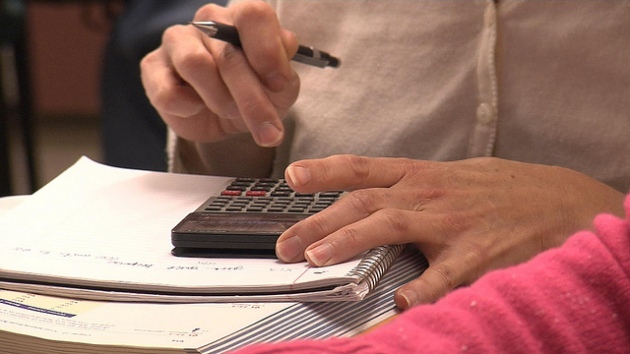Adam Greene CPA's Blog
Certified Public Account in Melville, NY
Tag Archives: CPA Exam
Why is getting the CPA license so good?
Posted by on September 10, 2016
As Adam Greene has mentioned this far, becoming a Certified Public Accountant has its perks: CPAs are often seen as figures of prestige and respect amongst professionals, colleagues, customers, clients and people. Although it takes a lot to become a proficient CPA, it definitely pays off in the end; years of studying and making sacrifices — having to skip that night out with friends and peers; that movie date; etc. —; years of understanding lots of technical terms aside the ones related to standard accountancy will end up allowing future CPAs to achieve a much higher level of expertise in the matter.

Courtesy of foam at Flickr.com
Greene has also insisted that being awarded the CPA license allows CPAs to survive in the current highly competitive marketplace. It is not a secret that most careers lack the capacity of fulfilling today’s market needs by themselves: it has become almost mandatory to go further and get a complementary degree in something valuable. In this sense, the CPA license provides CPAs with the stability they need, as they will not be affected by the ongoing market changes, moreover, accountants, and specifically CPAs, are always in demand. Since most professionals are currently short in experience, and lack the specific knowledge that is required for most jobs, passing the CPA license test is a good way for accountants to always be the perfect candidate for their job, thus, they will always be standing out from their competitors and a company’s potential future employees: CPAs not only are highly trained in their field, but also demonstrate that they are highly committed and determined professionals. Today’s companies value the fact that their employees are capable of demonstrating leadership skills at a managerial position, and here is where CPAs stand out. Within companies, being CPAs highly talented assets capable of carrying out their duties in the most proficient way, they can work on different areas as long as they involve a financial scenario, and, since nowadays economy is constantly evolving, almost every company will need the services of a CPA at some point.
And it gets even better! Since the United States will be adopting the International Standards, those with a CPA license will be able to seize the opportunity to have more job opportunities even around the world, which is obviously a greater step towards one’s own personal development.
These benefits aside, readers might wonder how much do CPAs earn in comparison to their colleagues who do not have the license. Well, being a credited accountant allows CPAs to earn up to 15% more than their non-credited competitors. Moreover, CPAs get promoted more often due to their highly valuable set of skills. In this sense, CPAs are more likely to achieve their career goals in a shorter period of time than standard accountants.
It sounds wonderful, right? Well, in order to enjoy the perks of being a CPA, readers must first pass the CPA license test. Since readers might already be familiar with what the test is about, there are other valuable tips and recommendations and guidance:
Since the CPA test is rather challenging as readers might already now, it is vital to be well prepared before attempting to take it. It would be also advisable to study up to three months or more before the first part. If readers are already working, it would be wise to widen that lapse even longer. It is of high importance to know how to use time properly and avoid every possible and plausible distraction in order to increase the chances of passing the test greatly.
But, what if readers fail? Surely they will feel miserable first and even more surely they will feel like abandoning it all, or that they are not astute enough to both pass the test and be a CPA. Failing the test might even get readers to hate the profession. Nonetheless, even though these kind of emotions are real at some point — they actually felt them —, nothing compares to the joy of having passed the test. Some people end up failing the test as a consequence of the lack of proper time management: as almost every aspect in life, wanting to become a CPA is easier said than done. Being committed to studying with plenty of days of anticipation, getting serious about what readers are about the face in accordance to their career goals will suffice.

Courtesy of Giuseppe Milo at Flickr.com
Almost everyone with the will to succeed will end up passing the test successfully. There is no magical trick aside from studying, committing and eliminating all kinds of distraction — and stop procrastinating — from study times. Picturing oneself as a more qualified professional in this evolving and changing economy is the best motivation that exists. Everyone is smart enough to achieve it.
Questions CPA candidates have before taking the exam
Posted by on August 7, 2016
Everybody gets nervous before taking any type of exam. Even for your driving test you get very nervous, even though you already have been driving your parent´s car for almost 2 or 3 years. Taking exams is scientifically proven to cause feelings that make you feel anxious and stressed.

Image courtesy of Thomas Eagle at Flickr.com
In the case of the CPA exam, things get worse. The CPA exam is a test that will give you certification in order to be a certified accountant in the United States. The whole test can be taken in 12- 18 months and it is taken by sections. It is long and expensive and it is hard to pass.
So, what questions do CPA candidates have before they take the test? More importantly, what are the doubts that everybody could have before even thinking about becoming a CPA accountant?
Adam Green will try to address some of those questions that are more common among CPA candidates that are seriously thinking about taking the next step towards their future.
Question #1:
Should I wait to get my exam score before I schedule my next exam?
People tend to think that if you pass the first test the rest of them will be easy. Each section has its own difficulty so that argument is not valid. You should make a plan to take all four CPA Exam sections within 12 to 18 months. Maybe the money issues could affect your plan, but if it is possible you should schedule everything in advance. Plus, scheduling your exam sections in advance is a great way to commit yourself to studying.
Question #2:
Is it a good idea to take the exam if I work full time?
We have seen this topic in previous posts and the answer is yes. Even if you work full time, you should still be able to find time to prepare for and pass the exam over 18 months. You really have to commit and design a plan where everybody, even your dog, helps you out passing the test. For example, you can commit to studying two hours a night after work. If you miss one day, you can make up for it another day. Use lunch hours and transportation hours, in a bus or in your car with audios. It will take some scheduling and effort but it is quite easy to study more or less between 10 to 15 hours every week if your really are organized.

Image courtesy of Found Animals Foundation at Flickr.com
Question #3:
What are the techniques for the last week before the test?
The idea is to focus on everything until the last day. If your study plan allows some day of rest before the test, use them to review and to read things that will keep your mind active on the topic. Don’t focus solely on MCQ. Instead, do a high-level overview of everything you’ll be tested on, including SIMs. Identify the areas where you are weakest and do your best to focus on sharpening those skills in the last days of studying.
Question #4:
Will a past bankruptcy (Chapter 7) or a DUI prevent me from getting the CPA license?
As for the first part of the question: that would be a decision for the licensing agency in the state in which you intend to license and or sit for the exam. As for the other part of the question, does a DUI fine affect my CPA license application?: The CPA test has a part where they want to know if the candidate is morally competent. In other words, the state board requires candidates for a licensee to have “good moral character”. This good moral character is demonstrated by the lack of a history of dishonest or felonious acts. I can bet that many people pass this test with DUIs or other minor traffic offenses. Applicant’s moral character and DUIs are not considered misdemeanor driving offenses.
Question #5:
I did not get my degree in the US. How do I know if my coursework fits the educational requirements?
For the CPA exam, a bachelor degree in a 4-year university is the minimum requirement to sit for the exam. If you are in the United States and studied here, there is no problem whatsoever. But for international students, this can be tricky as they aren’t sure whether the degree from their local countries is qualified. Foreign candidates will need to select the state in which to register for the exam because each state has its own list of approved evaluation agencies and it is important to pay for a recognized report; and because each state board has slightly different qualifying rules so the agency needs to know which rules to apply to when reviewing the transcripts.
Take a look at this amazing article on tips to pass the CPA test
14 tips to ace that CPA test
Posted by on July 24, 2016
So you think you’re ready to take that CPA exam. You want to get the best results on the first try, since this is an expensive test. All four parts of it. There are several different ways to prepare in order to take the CPA test. Let’s take a quick look at several different approaches and techniques that will hopefully be useful.

Image courtesy of unsplash.com at pexels.com
- Take a look at the topics related to the section that you are preparing to take. Remember that the sections are Financial Accounting and Reporting, Regulation, Auditing and Attestation, and Business Environment and Concepts.
- Consider taking the part of the exam that you enjoy the most first. If you are looking for good results, focusing on something that you like will probably yield those results.
- It is recommended that you study between 260 and 390 hours, total, if you really want to master the topics that will be evaluated in the CPA exam. You will clearly spend more time in certain topics than in others, but it’s likely that you will spend about 50 to 90 hours on each section. The number of hours you spend studying will be directly proportional to the amount of points that you’ll get in the end.
- When it comes to actually studying for the test, it’s not recommended that you study every day, since you will get tired and your preparation won’t be efficient. What you want to do is maximize the productivity of the time that you spend studying. It’s okay to take a couple of days off every week without thinking about the exam. Get some rest, get your mind off of it, entertain yourself, take a walk, do something different that you enjoy. This way of preparing will surely help you increase the amount of points that you will get on the test.
- It’s also a good idea to exercise a little in order to keep yourself stress free and in good physical and mental shape. You don’t have to be perfect, as long as you get a sufficient amount of points to pass the test. It’s not worth it to wear yourself out, there’s no point in doing this.
- When it comes to deciding the amount of time that you will spend studying each day, you should be realistic about the number of hours that you can dedicate to this endeavor without exhausting yourself.
- If you have a study guide, read the questions, take notes that are short and easy to understand, use memory cards or flashcards, and simply keep on doing this until you have accumulated a sufficient number of hours. Don’t waste your time planning how you’re going to study, just do it.

Image courtesy of Dean Hochman at Flickr.com
- It’s important for you to keep track of how much time you have spent studying, so you can decide if your progress so far has been good or if it needs to improve as the date of the exam approaches.
- Beware of procrastination. Don’t put off the parts of the test that you find hard to study or understand. Stick to your schedule and manage your time appropriately. Don’t do things later if you can do them now. This is why it’s important for you to have a schedule.
- The goal of the CPA exam is not to answer all of the questions with absolutely perfect answers, but to answer enough questions in order to actually pass the test. You don’t have to know everything, every single little detail. What you have to do is make sure you study as much as you can to cover as many topics as possible, and just keep moving from one topic to another.
- Another advisable thing when it comes to preparing for the CPA test is to trust yourself, be confident. This is often overlooked. The exam may be hard but it’s not impossible to win. If you are willing to organize your time and your energy and make up your mind to pass the test, you will accomplish it. All you need is some effort and a positive attitude.
- While studying for the CPA exam, it’s very important for you to take notes. This will allow you to remember the information when the time comes to actually answer the questions on the test. You can always review your notes during the time that you’ll spend studying for the test. Read them over and over again, this’ll help you learn everything you need in order to pass the test.
- Keep in mind that your grade on the CPA exam depends on the value of the questions that you get correct, which is why you should never leave blank answers.
- When preparing your study schedule, it’s recommended that you set goals for each week, in order for you to be able to keep track of them and see how you are advancing -or not- over time.
Recent contents
Read Adam Greene’s How to study for a CPA test while working full time
Basic requirements you need to know in order to get a CPA license
Posted by on June 27, 2016

Image courtesy of foam at Flickr.com
Requirements for becoming a Certified Public Accountant (CPA) vary from one state to another. The CPA license is issued by the board of accountancy of each of the 54 U.S jurisdictions (50 states and 4 jurisdictions). A candidate becomes eligible for the exam by meeting a list of specific requirements which are determined by the board of accountancy of the jurisdiction where it is applying from.
In this article, Adam Greene CPA will share a list of requirements that every candidate should keep in mind when taking the CPA exam.
1 . Academic Requirements
In the U.S every state has a Board of Accountancy, which is in charge of issuing the license that certifies public accountants (CPAs) who are going to practice in that one state. Every single Board of Accountancy has its own rules and parameters in order to issue a CPA license. In some states, having a 120-credit bachelor’s degree in accounting is enough, but as a general rule, most states now require to complete a 150-credit college degree program in accounting to earn the right to sit and take the CPA exam.
Some general requirements that almost every U.S. state demands, in order to be suitable to take the test, are listed below:
- A 150-credit college or university degree whose accreditation is accepted by the state’s Board of Accountancy.
- A minimum of a bachelor’s degree in accounting.
- A specified number of accounting and business courses.
You can find a detailed list of requirements for each state by clicking here.
In some states you can still take the CPA exam by having a bachelor’s degree in accounting, however, based on recent changes in the general requirements for taking the exam, you will be more likely to become a certified accountant if you have coursed the 150-credit program. Keep in mind that there are some Colleges and Universities with high-quality accounting degree programs that offer both options – the one with fewer credits and the one with the 150-credit program. Choose wisely if what you really want is to become a CPA.
2. Grading standards.
In order to become a candidate to take the CPA exam, you should keep in mind that you will be expected to have above average grades in your accounting courses. Most of these courses are difficult and require you to understand and work with often complex financial concepts. Statistics show that less than 50% of students who enroll in a bachelor’s degree program in accounting actually earn a 150-credit degree in accounting and make it to the CPA exam.
If by all means, your main goal is to become a Certified Public Accountant, you should start preparing while still in high school. Many high school offer alternatives to start a “College Track”, you can enroll in more than one Advanced Placement (APs) or Post-Secondary Enrollment Option (PSEO). Taking one of these options will definitely give you an advantage over other candidates.
3. Academic Requirements Exceptions
Sometimes the State Boards of Accountancy allow a measure of flexibility when it comes to coursing the 150 college credits needed in order to sit for the CPA. Below you can find three examples of some of the most common exceptions:
- If you have obtained a bachelor’s degree in accounting from a college or university known for its outstanding undergraduate program and you attended another prestigious institution to earn an MBA degree.
- If you have obtained a bachelor’s degree in accounting from a college or university known for its outstanding undergraduate program and you attended another prestigious institution to earn a graduate degree in taxation.
- If you finished you 150-credit degree in less than four years because you earned some credits in high school due to the AP or PSEO.

Image courtesy of wistechcolleges at Flickr.com
4. Taking the CPA Exam
Usually, you should sit for the CPA exam as soon as you meet all the state Board of Accountancy academic requirements. The main reason to this is that you still have all the information from your accounting courses fresh in your mind.
As a recommendation, you should take a review course before taking the CPA exam, this will help you be better prepared. Remember that the CPA Exam is infamous for its low pass rates with a success rate average below 50%.
5. Other requirements
Ethics: After successfully passing the CPA Exam, every applicant must take an ethics course and/or exam in order to get its CPA license is issued. This requirement also changes from one state to another. It is recommended that you check your state’s ethics requirements at the State Boards of Accountancy.
Work Experience: The amount of time required for earning the CPA license also varies from one state to another. Nevertheless, in each state you should find an accounting position that can provide you with the experience required to get your license issued.
Renewing your CPA License: In some states, you can be required to renew your CPA license every one or two years. Usually, most states require accountants to take Continuing Professional Education (CPE) hours to maintain a CPA license.